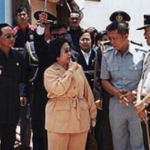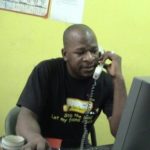By Jenni Chang & Lisa Lisa Dazols
August 2011
It’s always hard to find lesbians, but it’s especially challenging in Java, Indonesia where ninety percent of the population is Muslim and women fight against second class status. Amongst the jilbab dressing, we spot a fohawk and meet Ema.
A university student who often gets mistaken around town for a boy, Ema challenges ideals of femininity in Indonesia. Ema meets us at a cafe with her girlfriend, and we recognize that the couple is reserved about displaying public affection. But speaking to them and learning about the sacrifices they’ve made for each other, we can tell they are deeply in love. While her girlfriend declines an interview for safety reasons, they’re very enthusiastic to meet with another lesbian couple and share their experience.
As young activists and community organizers, we recognize that Ema (photo right) and her partner are the Supergays of their community. They wear t-shirts from their organization, Peace Generation, which uses film, art, and political demonstrations to communicate messages of peace in a country that still runs high with ethnic and social tensions.
Growing up, Ema first realized she was gay through international role models. She says, “I realized it in Junior High school. I was 12 years old. I heard the term ‘homosexual’ from my friends who teased me ‘You’re hombrang‘ they would say. One year later I heard about t.A.T.u,, a lesbian music duo from Russia. They were very famous at the time in Indonesia. I heard the word lesbian for the first time. I had to see outside my small world to think, ‘maybe I am alright and nothing is wrong’. That was the turning point.”
Ema struggled with her Catholic faith when she fell in love with her best friend. She says, “I never thought about telling someone else about myself. It was so frightening to me. But I didn’t want to lie to someone that I love. I needed to tell her. I never thought we could be partners or a couple. I just said, ‘Here I am. I’m your best friend. The fact is that I have to tell you I am a lesbian and I love you.’ She said, ‘Don’t you think it’s a sin?’ I said, ‘I don’t know. The church says it’s a sin, but I just love you.”
Eventually, the two women came to accept their sexualities and begin a relationship, but for Ema’s partner it ended up costing her job. They moved from their hometown to the larger city of Jojykarta to pursue new lives, and they’ve now happily been together for four years.

Unfortunately, progress is still slow for gay rights in Indonesia. Recently, Ema helped organize QFest, a LGBT film festival in Indonesia that toured through nine cities. She says, “The fundamentalist Muslims attacked us saying ‘God hates homosexuals.’ They hit us with sticks. The most shocking thing for me is that I met many friends there as enemies.” Ema believes that laws are becoming more conservative in Indonesia and wants to use her law degree to ensure basic human rights. “I fear that the things are worsening for women and gays here.” (photo left: Borobudur stupa, Java)
Ema makes daily decisions on when to come out and when to stay in the closet. “Sometimes I need to put my sexual orientation in the closet. It’s better not to tell everyone.” She emphasizes the need to first gain respect. “I hope to become a leader of my community so that society can see that there is a lot I can contribute. If I can prove myself to the community, then they will accept me as I am.”
Despite not having as much freedom as she deserves, she is confident about her identity, “What’s wrong with my love? My love is not fake. I really love my someone special.”
YouTube Video of Interview with Ema
More on LGBT Rights in Indonesia
Also see these other videos by Jenni and Lisa during their year-long trek around Asia and Africa to find ‘Supergays’:
A Day in the Life of a Balinese HIV Worker
Interview with Hon. Michael Kirby, Former Austalian High Court (Gay) Justice
Ricky Reyes–Philippine Philanthropist, Hair Stylist and Entrepreneuer
Originally published in Out and Around.com
















